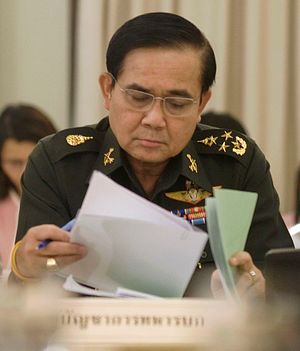2015 was a year of stillness in Thailand, at least in the political realm.
The military staged a coup that ousted Yingluck Shinawatra’s elected government in May 2014. Throughout 2015, the military regime of General Prayuth Chan-ocha — Thailand’s current prime minister — promised a number of projects that claimed to put Thailand back on the democratic track. But these promises proved to be empty.
Two major events in 2015 in particular served to question the sincerity of the junta in its endeavor to reform Thailand.
The first was the failure of the constitutional drafting process. Tasked with writing a new constitution, the Constitutional Drafting Committees presented their charter to military-appointed parliamentarians but it was not approved.
The nature of the new constitution was in itself controversial: it was designed to prevent powerful political parties, like that of Thaksin and Yingluck Shinawatra, from easily returning to power. This was because it encouraged independent candidates to run for parliamentary seats. These independents were expected to take a fair share of seats from the Shinawatras.
The rejection of the constitution, though pointing to the junta’s incompetency in the drafting mission, helps to prolong the life of the military government. This strongly implies that the junta is planning to stay in power at least until after the royal transition. King Bhumibol Adulyadej has been ill. The anxiety that comes with the thought of a royal succession prompted the military to take charge of political power to defend the interests of the royal institution and itself.
Of course, drafting a new charter is not easy. After all, the military government aims to exploit the constitution to justify its ongoing influence over politics even after it has to step down from power. With this in mind, it seems that the new constitution — which is currently being re-drafted by military-appointed committees — will have little to do with promoting political reform, but will rather empower extra-constitutional institutions.
So, while the military government has promised to hold an election in 2016, there is little hope that the election will effectively shift Thailand’s political landscape away from the traditional powers. This reality will undermine the confidence of foreign businesses, which fear that a political deadlock in Thailand following the election will push the country further into the abyss.
The other major event, which successfully created a climate of fear in Thailand, was a string of arrests of individuals who had worked with the royal family on corruption charges. The death of the famed fortune-teller Suriyan Sucharitpolwongse, known by his Thai nickname Moh Yong, reaffirmed the dark world surrounding the Thai monarchy.
Prior to his mysterious death in detention, Moh Yong worked closely with the army and Crown Prince Maha Vajiralongkorn. He helped publicise big campaigns, including ‘Bike for Mum’ — which celebrated the Queen’s birthday in August 2015 — as part of an effort to consolidate the monarchy’s public role. But he was later charged with corruption as well as exploiting the name of the monarchy for his own end — the latter charge was brought under Thailand’s lèse majesté law. The arrest of Moh Yong was only the tip of the iceberg. His case led to the arrests of several high-ranking military and police officers.
Some analysts argue that the systematic purge of key figures surrounding the Crown Prince was an indication of fragmentation among royalists. The arrests of some military men also hinted at a power struggle within the army. More importantly, this climate of fear suggests the continued abuse of the lèse majesté law for political purposes. And the fact that the Crown Prince seemed to give a green light to charging individuals once loyal to him with lèse majesté could indicate that this harsh law will be fully exercised under the forthcoming reign of Vajiralongkorn. This is a sad sign for the future of human rights in Thailand.
Looking ahead, things seem bleak for 2016. Already, Prime Minster Prayuth has told the Thai media that the election might be delayed. The actual date might even be after 2017. The constitution will be approved at some point in 2016, but for the time being its content is still under wraps. Meanwhile, human rights violations will continue to take place since the space for free expression has been seriously limited.
On the economic front, the junta has failed to deliver successful business-oriented policy in 2015. Its first economic team, led by the economist and banker ML Pridiyathorn Devakula, . Although the junta borrowed populism à la Thaksin as a way to boost the local economy, it lacked the golden touch once enjoyed by the Thaksin administration. Revitalising the economy will be a major challenge in 2016.
With its continuing troubles, including the uncertainty that will accompany an eventual royal succession, Thailand should not be too excited to welcome 2016.
Pavin Chachavalpongpun is Associate Professor at Kyoto University’s Center for Southeast Asian Studies. This piece was originally published over at East Asia Forum here and is republished with kind permission.

































